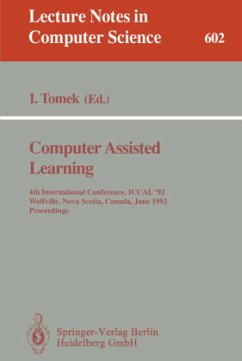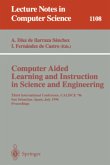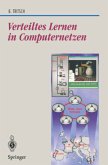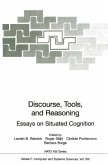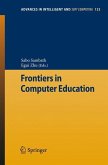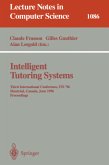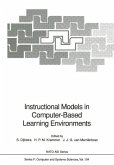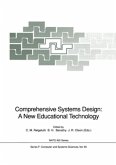Ivan Tomek (ed.)4th International Conference, ICCAL '92, Wolfville, Nova Scotia, Canada, June 17-20, 1992. Proceedings
Computer Assisted Learning
4th International Conference, ICCAL '92, Wolfville, Nova Scotia, Canada, June 17-20, 1992. Proceedings
Mitarbeit:Tomek, Ivan
Ivan Tomek (ed.)4th International Conference, ICCAL '92, Wolfville, Nova Scotia, Canada, June 17-20, 1992. Proceedings
Computer Assisted Learning
4th International Conference, ICCAL '92, Wolfville, Nova Scotia, Canada, June 17-20, 1992. Proceedings
Mitarbeit:Tomek, Ivan
- Broschiertes Buch
- Merkliste
- Auf die Merkliste
- Bewerten Bewerten
- Teilen
- Produkt teilen
- Produkterinnerung
- Produkterinnerung
ICCAL, the International Conference on Computers andLearning, is a forum for the exchange of ideas andpresentation of developments in the theory andpractice ofcomputer uses in education, with a focus on post-secondaryeducation. ICCAL '92 was held at Acadia University inWolfville, Nova Scotia, Canada, June 17-20, 1992.This volume presents the proceedings of ICCAL '92, andfeatures 45 submitted and 6 invited papers. Topics addressedinclude hypermedia systems, multimedia learningenvironments, educational strategies, knowledge basedtutors, program visualization systems, intelligent tutoringsystems,…mehr
Andere Kunden interessierten sich auch für
![Computer Aided Learning and Instruction in Science and Engineering Computer Aided Learning and Instruction in Science and Engineering]() Diaz de Ilarraza SanchezComputer Aided Learning and Instruction in Science and Engineering39,99 €
Diaz de Ilarraza SanchezComputer Aided Learning and Instruction in Science and Engineering39,99 €![Verteiltes Lernen in Computernetzen Verteiltes Lernen in Computernetzen]() Bernhard TritschVerteiltes Lernen in Computernetzen54,99 €
Bernhard TritschVerteiltes Lernen in Computernetzen54,99 €![Discourse, Tools, and Reasoning Discourse, Tools, and Reasoning]() ResnickDiscourse, Tools, and Reasoning153,99 €
ResnickDiscourse, Tools, and Reasoning153,99 €![Frontiers in Computer Education Frontiers in Computer Education]() Frontiers in Computer Education231,99 €
Frontiers in Computer Education231,99 €![Intelligent Tutoring Systems Intelligent Tutoring Systems]() FrassonIntelligent Tutoring Systems77,99 €
FrassonIntelligent Tutoring Systems77,99 €![Instructional Models in Computer-Based Learning Environments Instructional Models in Computer-Based Learning Environments]() Instructional Models in Computer-Based Learning Environments153,99 €
Instructional Models in Computer-Based Learning Environments153,99 €![Comprehensive Systems Design: A New Educational Technology Comprehensive Systems Design: A New Educational Technology]() ReigeluthComprehensive Systems Design: A New Educational Technology153,99 €
ReigeluthComprehensive Systems Design: A New Educational Technology153,99 €-
-
-
ICCAL, the International Conference on Computers andLearning, is a forum for the exchange of ideas andpresentation of developments in the theory andpractice ofcomputer uses in education, with a focus on post-secondaryeducation. ICCAL '92 was held at Acadia University inWolfville, Nova Scotia, Canada, June 17-20, 1992.This volume presents the proceedings of ICCAL '92, andfeatures 45 submitted and 6 invited papers. Topics addressedinclude hypermedia systems, multimedia learningenvironments, educational strategies, knowledge basedtutors, program visualization systems, intelligent tutoringsystems, mouse and touchscreen comparison, cooperativemultimedia, authoring systems, language learning, spellingremediation, teaching geometry, a tutoring assistant forarithmetic, a learning package for statistics,conversational pattern learning, adaptive navigationaltools, and many more.
Produktdetails
- Produktdetails
- Verlag: Springer / Springer Berlin Heidelberg / Springer, Berlin
- Artikelnr. des Verlages: 978-3-540-55578-0
- 1992.
- Seitenzahl: 632
- Erscheinungstermin: 27. Mai 1992
- Englisch
- Abmessung: 235mm x 155mm x 34mm
- Gewicht: 865g
- ISBN-13: 9783540555780
- ISBN-10: 3540555781
- Artikelnr.: 09246873
- Herstellerkennzeichnung
- Springer-Verlag KG
- Sachsenplatz 4-6
- 1201 Wien, AT
- ProductSafety@springernature.com
- Verlag: Springer / Springer Berlin Heidelberg / Springer, Berlin
- Artikelnr. des Verlages: 978-3-540-55578-0
- 1992.
- Seitenzahl: 632
- Erscheinungstermin: 27. Mai 1992
- Englisch
- Abmessung: 235mm x 155mm x 34mm
- Gewicht: 865g
- ISBN-13: 9783540555780
- ISBN-10: 3540555781
- Artikelnr.: 09246873
- Herstellerkennzeichnung
- Springer-Verlag KG
- Sachsenplatz 4-6
- 1201 Wien, AT
- ProductSafety@springernature.com
Why hypermedia systems are important.- Project CALC: Calculus as a laboratory course.- The structures of advanced multimedia learning environments: Reconfiguring space, time, story, and text.- Adjusting to the paradim shift in teaching and learning or what do I do now???.- Engagement and construction: Educational strategies for the post-TV era.- Building knowledge based tutors.- Learning styles and computer-based learning environments.- Text and graphics in instructional design.- Assessing program visualization systems as instructional aids.- At last! A computer aid for the teaching of electronics which answers all the nagging questions about capacitors.- An object oriented approach to produce educational hypermedia software.- A cognitive model of programming knowledge for procedural languages.- Programming by experimentation and example.- An experiment of cooperative learning with Hypercard.- An ITS for engineering domains concept, design and application.- Structuring the subject matter.- MIDI draw: Designing an impressionistic medium for young musicians, artists, and writers.- Standardized architecture for integrated open courseware.- Formal techniques in higher education: A proposal.- QUIZ, a distributed intelligent tutoring system.- Intelligent tutorial system in medicine through an interactive testing program: HyperMIR.- DCE: A knowledge-based tutoring and advisory system - Tutoring strategies and architecture.- Discourse style and situation viewpoint for a conversational language tutor.- Open structured CAI system for Kanji learning.- The sum of the parts is greater than the whole in online graduate education.- Development of GeoBlock: a micro-world for learning and teaching geometry.- SODA: A computer-aided design environment for the doing and learning of software design.- A graphical CAL author language.- A knowledge base approach to learning to program in Prolog.- Self-adjusting curriculum planning in Sherlock II.- Integrating an educational simulation into a Logic Design course.- An algorithm animation programming environment.- ABASE: A Hypermedia-based tutoring and authoring system.- A tool for developing intelligent tutoring systems.- Applying computer models of phonological competence to C.A.L.L..- Vigilance in a long-term cognitive computing task: The effects of subject strategy and screen colour on performance.- Mastering the machine: A comparison of the mouse and touch screen for children's use of computers.- An authoring system for ITS which is based on a generic level of tutoring strategies.- The uses of multiple student inputs in modeling and lesson planning in CAI and ICAI programs.- Project Nestor: New approaches to cooperative multimedia authoring/learning.- Design and implementation of courseware for teaching programming languages.- Objector, yet another authoring system.- Design and evaluation of the SUMIT intelligent teaching assistant for arithmetic.- Spelling remediation for dyslexic children using the selfspell programs.- Using HyperCard to create a flexible learning package for statistics: Costs, benefits and effectiveness.- Educational software engineering: A methodology based on cooperative developments.- Environmental CAL for conversation pattern learning.- Adaptive navigational tools for educational hypermedia.- A tool for storing and exploring ideas.- Dynamic CAL-courseware generation within an ITS-shell architecture.- Callguide: using programmable hypertext as a shell for Call programs.
Why hypermedia systems are important.- Project CALC: Calculus as a laboratory course.- The structures of advanced multimedia learning environments: Reconfiguring space, time, story, and text.- Adjusting to the paradim shift in teaching and learning or what do I do now???.- Engagement and construction: Educational strategies for the post-TV era.- Building knowledge based tutors.- Learning styles and computer-based learning environments.- Text and graphics in instructional design.- Assessing program visualization systems as instructional aids.- At last! A computer aid for the teaching of electronics which answers all the nagging questions about capacitors.- An object oriented approach to produce educational hypermedia software.- A cognitive model of programming knowledge for procedural languages.- Programming by experimentation and example.- An experiment of cooperative learning with Hypercard.- An ITS for engineering domains concept, design and application.- Structuring the subject matter.- MIDI draw: Designing an impressionistic medium for young musicians, artists, and writers.- Standardized architecture for integrated open courseware.- Formal techniques in higher education: A proposal.- QUIZ, a distributed intelligent tutoring system.- Intelligent tutorial system in medicine through an interactive testing program: HyperMIR.- DCE: A knowledge-based tutoring and advisory system - Tutoring strategies and architecture.- Discourse style and situation viewpoint for a conversational language tutor.- Open structured CAI system for Kanji learning.- The sum of the parts is greater than the whole in online graduate education.- Development of GeoBlock: a micro-world for learning and teaching geometry.- SODA: A computer-aided design environment for the doing and learning of software design.- A graphical CAL author language.- A knowledge base approach to learning to program in Prolog.- Self-adjusting curriculum planning in Sherlock II.- Integrating an educational simulation into a Logic Design course.- An algorithm animation programming environment.- ABASE: A Hypermedia-based tutoring and authoring system.- A tool for developing intelligent tutoring systems.- Applying computer models of phonological competence to C.A.L.L..- Vigilance in a long-term cognitive computing task: The effects of subject strategy and screen colour on performance.- Mastering the machine: A comparison of the mouse and touch screen for children's use of computers.- An authoring system for ITS which is based on a generic level of tutoring strategies.- The uses of multiple student inputs in modeling and lesson planning in CAI and ICAI programs.- Project Nestor: New approaches to cooperative multimedia authoring/learning.- Design and implementation of courseware for teaching programming languages.- Objector, yet another authoring system.- Design and evaluation of the SUMIT intelligent teaching assistant for arithmetic.- Spelling remediation for dyslexic children using the selfspell programs.- Using HyperCard to create a flexible learning package for statistics: Costs, benefits and effectiveness.- Educational software engineering: A methodology based on cooperative developments.- Environmental CAL for conversation pattern learning.- Adaptive navigational tools for educational hypermedia.- A tool for storing and exploring ideas.- Dynamic CAL-courseware generation within an ITS-shell architecture.- Callguide: using programmable hypertext as a shell for Call programs.

